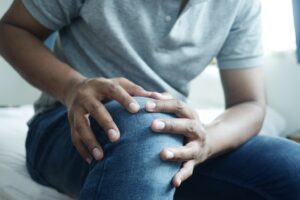Guest Blog: 5 Pain Management Tips for Elders Dealing with Knee Pain
Knee pain is a common ailment for older adults. Unfortunately, the swelling and stiffness that lead to this condition can stop patients from performing daily routines. Here are five pain management tips for elders with knee pain.
An inactive lifestyle can contribute to pain and inflammation in the knee. On the other hand, regular exercise can help keep the muscles that support the knee joint strong and flexible. Try doing low-impact activities such as walking, swimming, or biking. Always increase the intensity of your workout gradually. Stop if your knees hurt.
Ice Packs and Heat Therapy
Applying ice packs to the affected area can reduce swelling and inflammation. Use an ice pack for 10-15 minutes every 2-3 hours for the first 2-3 days. Then reduce the frequency and duration of use over time. Apply heat to the knee using a heating pad. You can also apply a warm, moist towel to the knee several times daily to reduce pain and stiffness.
Medication
Over-the-counter medications such as aspirin and ibuprofen can help reduce inflammation and pain. However, these medications should be given under a physician’s prescription. Talk to your doctor about the best treatment option for you.
Maintain a Healthy Weight
Weight gain can increase the pressure on the knee joint and lead to pain and discomfort. Maintaining a healthy weight through diet and exercise can help relieve this pressure and keep the knee joint healthy. See your doctor to help you develop a weight-loss plan tailored to your needs and goals.
Massage Therapy
Massaging the knee joints can also help improve the flexibility and mobility of the knee and promote healing. This is especially useful for individuals recovering from injury or surgery. A physical therapist will apply gentle pressure to specific body areas to promote relaxation and encourage blood flow. Studies have proven that massage therapy can help reduce pain and improve joint function in people with arthritis and other inflammatory conditions.
Knee Joint Pain Remedies
If you are experiencing knee pain, many remedies are available to help ease and improve your mobility. Below are some tips to help improve your overall health and reduce knee pain.
Rest
Rest sore joints as much as possible. Avoid activities that cause pain when your knee is painful or swollen. This can help reduce inflammation and relieve some of the pain. Rest for at least a few days to allow your knee joint to heal. In the meantime, try to keep the knee in as straight of a line as possible.
Acupuncture
This is a clinically tested procedure involving inserting fine, sterile needles into the skin at specific points that correspond to different body systems. Regular acupuncture sessions can reduce pain and improve the range of motion.
Compression Bandage
Compression bandages are also known as elastic knee bands. Wearing a compression bandage can help reduce swelling in your knee and improve mobility. The bandage also provides support to help keep the joints stable and prevent further injury.
Stretches
Stretching can also help to improve flexibility and reduce pain. One stretch that is particularly effective for knee pain relief is the quadriceps stretch. It involves straightening one leg and bending the other at the knee so that the shin is parallel to the ground. Keep your back straight as you hold the stretch for 20-30 seconds, and repeat with the other leg.
Aromatherapy
Massaging oils such as eucalyptus into the knee joint can also relieve pain and stiffness. Essential oils containing cinnamon, sesame, orange and ginger can help reduce pain caused by osteoarthritis. They may also improve flexibility and functionality in the knees.
When to Seek Medical Advice?
If the pain persists for more than one week or worsens over time, you should make an appointment with your doctor so they can help diagnose and treat your pain. You may also want to visit your doctor if you experience redness, swelling, muscle weakness, or when you can’t put weight on your knee. Your doctor will examine your knee for mobility, flexibility and general functionality. MRI/CT or X-rays scan can help identify injuries or deformities. Occasionally, your doctor may need a small amount of joint fluid for testing.
Knee pain can cause discomfort and prevent you from doing daily routines. Thankfully, the above tips can help you overcome pain and discomfort in your knees.

